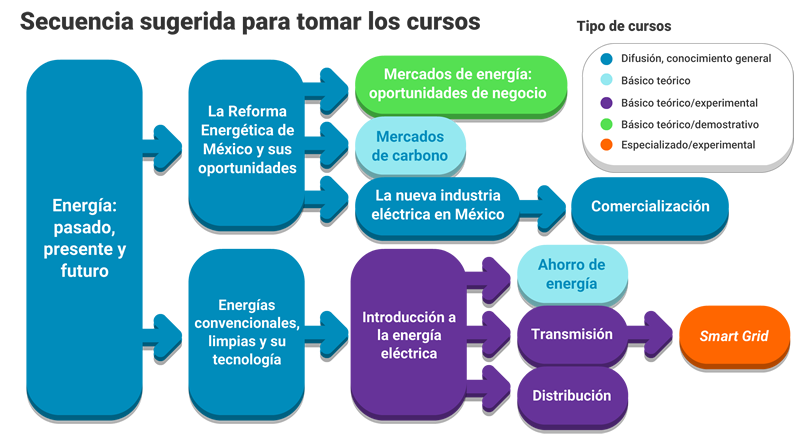Do you know the business opportunities that energy markets offer to you? Do you know how those markets emerged? In this course, you will be able to find detailed answers to these questions.
We could currently split energetic market into the following:
- Oil and associated gas.
- Liquid from oil such as gasoline and diesel.
- Petrochemical industry.
- Market of Gas and oil products transportation.
- Electric generation.
- Electric commercialization.
- Renewable and clean energy generation such as wind, solar, biomass, and hydraulic.
These markets and energetic reform itself require people prepared for the multiple spaces presented. Through the topics of this course, you will learn the energetic regulations in México, which will help you to understand the current scene and the future of energy markets, and its applications in the entrepreneurial activity in all the steps of the energy field. Similarly, you will be able to analyze the secondary regulations for the sector of oil, gas, electric energy, and all its chains of value, with the purpose of comparing energetic markets in transition and contrasting these with experience from mature markets from the world.
Taking this course will give you the unique opportunity to define entrepreneurial opportunities and design energy businesses in transition markets.
TOPICS
Topic 1. Regulations that frame the energy business
- Theory of Monopoly, regulation, and deregulation.
- Regulation to specific energy sectors.
- Supply-Demand of energy in its parts of oil, gas, electricity from fossil and renewable fuels.
- Theory and practice of energetic security.
Topic 2. Attributes compared of the competitive markets and energy regulated markets
- Regulators, their attributions, administrative and jurisdictional assets.
- The attributes of the energetic markets in competition.
- Energetic agenda compared internationally and the integration of markets.
- Markets through the borders: energy pool.
Topic 3. New hydrocarbon markets
- Regulated and in oil competence business.
- Learnings from world companies specialized in oil.
- Bidding rounds in Mexico and the world.
- The petrochemical and oil downstream business.
Topic 4. New markets for gas and gasoline
- Natural gas ecosystem and its transport infrastructure.
- Five-year plan of gas prospective and infrastructure in Mexico for business.
- World practices in gas and gasoline markets.
- Business opportunities in the field of oil, gas, and gasolines.
Topic 5. Electric industry: First Part
- Business opportunities in the restructured electric industry.
- Subsidiaries and affiliates with regulated and market parts.
- New glossary of terms and contrasts with the definitions from different markets.
- Learnings from regulations in the USA and regional electric markets.
Topic 6. Electric Industry: Second Part
- Foundations for the bulk electric market: role of the participants.
- Operation of the energy markets.
- Functions of the National Center of Energy Control and international comparatives.
- Green agenda and its regulation.
- Protection of designs and patents.
LEARNING RESULTS
Through this course, you will be able to:
- Define new business opportunities in the energy markets.
- Examine regulations against competitor segments and international contrasts.
- Design businesses in these markets.
TOPIC AREAS
- Engineering
- Economy and finance
- Law
PREVIOUS REQUISITES
- High school certificate issued or in process.
- Basic level of informatics tools.
The offering in energy topics is classified into five kinds of courses according to the objective they pursue:
- Communicate general knowledge: give general information regarding energy topics.
- Basic theory: exposing basic concepts related to energy topics.
- Basic experimental theory: approach the principles of electric energy and explore processes for its application.
- Basic demonstrative theory: verify the application of concepts through demonstrations.
- Experimental specialized: experiment with advanced concepts of electric energy through demonstrations and/or virtual laboratories.
Course staff
Alejandro Ibarra Yúnez. Ph.D.
His academic preparation includes: degree in Economics (Universidad de las Américas, Puebla), Master in Economics specialized in Latin American economy (Universidad de las Américas, Puebla), Master in Applied Economics (University of Michigan at Ann Arbor) , and Ph.D. in Economics specialized in Industrial Organization, as well as a Ph.D. in Administration and International Public Politics from Tecnológico de Monterrey.
His career as a professor and researcher of economy covers 38 years. Besides, he is a consultor for companies, institutions, and the government. He is a national researcher Level 1, his research is focused on economic analysis in network sectors, concentrated and subject to economic regulations, including comparative economic analysis and international business, international economy and finance, commercial treaties, business opportunities, economic and regulatory politics, and institutional economy.
He is also a researcher, currently head professor of Economy and Public Politics at EGADE Business School from Tecnologico de Monterrey, campus Monterrey. He specializes in net economies, and regulations. He has over 45 published articles in specialized magazines and 11 books, among them:
- • Economic and Regulatory Challenges and Opportunities for US-Mexico Electricity Trade and Cooperation, PRP Report #174, University of Texas at Austin, U. Texas Press, Mayo 2012.
- • Connecting People, Ideas, and Resources across Communities, D. Gibson, M. Heitor, y A. Ibarra-Yunez (Eds.), Purdue University Press, 2007.
Course Code: MDEO17091X
Starting date: September 25, 2017
Ending Date: November 11, 2017
Estimated effort: 5 hours a week.
Suggested Sequence

